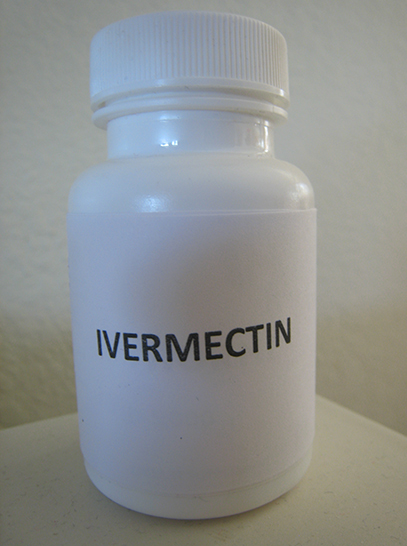We Now Know Why Ivermectin Helps In Some Research Studies And Not In Others
There has been a debate for some time about the efficacy of Ivermectin in treatment of COVID-19, and finally research reviewers have found what is likely the answer. It appears ivermectin benefits specific COVID-19 patients while other patients are not benefited. Three research reviewers went over 12 of the best ivermectin trials (they used only 12 of the studies as some research was thrown out due to inadequacy in the methods) with a fine tooth comb to find out why there are two opposing camps represented in the research.
Dr. Bitterman, Dr. Cices and Caitlin Martins had a hunch that ivermectin might not be directly affecting COVID-19, but could be indirectly decreasing mortality from COVID-19 by it’s activity as an antiparasitic. Parasites are able to alter our immune system and one theory is that the antiparasitic drug ivermectin might be killing off parasites, allowing the immune system to better protect an individual against COVID-19. Ivermectin is known for its use in treating the parasitic infection called stongyloidiasis, so this is what they focused on. Although, it is probably true that killing the parasites does help the immune system function more optimally when other pathogens are around, what was ultimately found is that there is a more complicated involvement with ivermectin, Strongyloides and corticosteroids that factors into the reason for ivermectin’s association with decreased mortality in some patients.
Those Regions of The World With Increased Strongyloides Showed A Protective Effect of Ivermectin
After reviewing the available research articles on ivermectin use for COVID-19 it was noted that the areas of the world where ivermectin was beneficial in research studies were in the areas with endemic strongyloidiasis. The reviewers found there was a decrease of relative risk of mortality of 39% for each 5% increase in strongyloidiasis prevalence. So, in other words, if you live in a region of the world where many people have strongyloidiasis and you get COVID-19 and go to the hospital where you are treated with ivermectin, you are more likely to live.
Strongyloides Stercoralis
Strongyloides stercoralis is a digestive tract parasite endemic in Latin America, Southeast Asia, and sub-Saharan Africa. Globally, 8.1% of the population is thought to have strongyloidiasis. This parasite can spread to other organs than the digestive tract and this hyperinfectious spread is called Strongyloides hyperinfection syndrome or SHS. The condition of SHS is often misdiagnosed and thought to be other illness. So, many of the people with it are not known to have it.
How Ivermectin Benefits COVID-19 Patients With Strongyloides Stercoralis
In Strongyloides hyperinfection syndrome the worm moves through the body to other organs. This is seen in immunosuppression such as happens with corticosteroid use. Corticosteroids have been used for COVID-19 to prevent severe over-reaction of the immune system. In someone with strongyloidiasis this would induce SHS. Unfortunately the mortality rate for SHS induction by corticosteroids is as high as 90% and has been noted after giving corticosteroids for COVID-19. Corticosteroids are contraindicated in someone with strongyloidiasis, but this illness is not always diagnosed, so the issue is that in strongyloidiasis-endemic areas there are individuals being given corticosteroids for COVID-19 who have strongyloidiasis, who are dying from the corticosteroid induced SHS. Those who have strongyloidiasis who are given ivermectin early on before getting the corticosteroids would be spared the SHS if the ivermectin cleared the Strongyloides infection. Some physicians are recommending that patients with COVID-19 in areas with endemic strongyloidiasis should be given ivermectin before starting Corticosteroid treatment to help prevent SHS. Not all physicians agree on this.
In A Nutshell – Ivermectin Benefits Specific COVID-19 Patients While Other Patients Are Not Benefited
Analysis of ivermectin studies showed ivermectin trials in areas with low incidence of strongyloidiasis were not associated with statistically significant decreases in mortality, while those studies in areas with high regional strongyloidiasis were associated with a significant decreased mortality. This is due to the ivermectin killing the Strongyloides parasite, thus giving the patient a better chance of survival, especially in those patients who are given corticosteroids.
As is often the case, while we as a society are arguing about two different sides of the same coin, the real truth lies in taking a more comprehensive examination of the coin to seek out the real truth.
There may still be other relevant factors to be found in this debate, but this is certainly a factor we can’t ignore.
Send To Friends And Family Who Would Want To Read This!
Additional articles on this virus and COVID-19.
Long Covid
Immune Support During Coronavirus and COVID-19
What We Know About Coronavirus and COVID-19
How the Coronavirus Affects The Brain
COVID-19 Vaccine Reactions
What Is The Coronavirus
Why More Men Die From COVID-19
Coronavirus Fear May Decrease Your Immunity
All Sorts of Details on Coronavirus and COVID-19
Tracking COVID-19
Coronavirus Disease Updates
Secondhand Smoke And COVID-19
COVID-19, Methylation And Prevention
Rethinking Ventilation
Intravenous Vitamin C For COVID-19
Protection and Prevention In A Pandemic
Connection Between COVID-19 and Glyphosate
Conventional Medicine Recognizes Their Hope In Combatting Severe COVID-19 Reactions Requires Preventative Medicine
COVID-19 Vaccinated Compared to Natural Immunity
Reducing COVID-19 Effects
Vaccinated Individuals Spread COVID-19 Too – Read about the science
Top 5 This Week
Related Posts
Ivermectin Benefits Specific COVID-19 Patients


